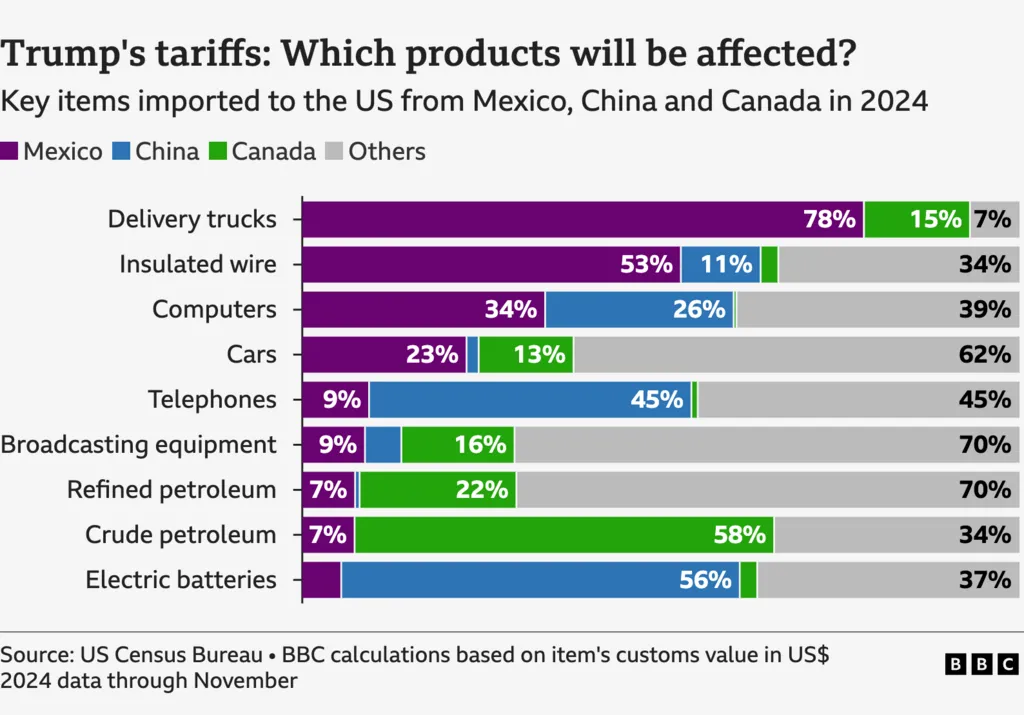 What is happening with tariffs against China?
What is happening with tariffs against China?Posted on 02/27/2025 9:10:32 AM PST by daniel1212
Tariffs are taxes charged on goods imported from other countries. The companies that bring the foreign goods into the country pay the tax to the government.
Typically, tariffs are a percentage of a product's value. The 10% tariff on Chinese goods means a product worth $10 would have an additional $1 charge applied to it.
Tariffs are a central part of Trump's economic plans. He promised to introduce import duties against some of America's main trade partners during his election campaign.
He says tariffs will boost US manufacturing and protect jobs, as well as raising tax revenue and growing the economy.
How Japan sparked Trump's 40-year love affair with tariffs.
Trump said the 25% tariff on both metals will come into effect on 12 March, with no exceptions.
The US is the world's largest importer of steel, with Canada, Brazil and Mexico its top three suppliers.
 What is happening with tariffs against China?
What is happening with tariffs against China?
Together, China, Mexico and Canada accounted for more than 40% of imports into the US in 2024.
A 10% charge on all goods imported from China took effect on 4 February.
Trump later said shipments worth less than $800 (£645) would be exempt.
Beijing retaliated with its own tariffs, which took effect on 10 February.
These include a 15% tariff on US coal and liquefied natural gas products, and a 10% tariff on crude oil, agricultural machinery and large engine cars.
(Excerpt) Read more at bbc.com ...
“Why is Trump using tariffs?”
More important than money, tariffs are a great cudgel to hold your not-so-friends and enemies to account.
Trump is using a multi pronged approach:
1. Bravado (Panama, Greenland, Canada)
2. Friendly proposals (Russia, Ukraine)
3. Tariffs (Canada, Mexico, China)
That is delivering real results we have not seen in decades.
All computers should be made here.
in the past, the income tax was phased in as tariffs were lowered.
in the future, tariffs can be raised so that the income tax can be phased out.
You can build your own rather easily, but as meaning parts, can't be done competitively, if at all, as the West lacks parts and the ecosystem, as meaning: China's overlapping tech-industrial ecosystems Jan 22, 2025China has developed multiple tech-industrial ecosystems that overlap in terms of the firms and technologies involved. China doesn't just have a smartphone industry or a battery industry or an electric vehicle industry
Three former presidents support permanent trade status for China
Times Herald ^ | May 9, 2000 | Associated Press Writer
Posted on 5/11/2023, 6:43:49 AM by daniel1212
Presidents Ford, Carter and Bush yesterday wrote an open letter backing legislation to grant permanent normal trade relations to China. Shoring up support on the right, Federal Reserve Chairman Alan Greenspan said he too is behind the measure, which would ease the communist nation’s long-desired entry into the World Trade Organization....
The former presidents said granting China permanent trade benefits would build upon market-opening initiatives pursued by every American president since World War II.”It will open China’s markets to us without increasing China’s access to our market,” the presidents said....
Ford and Carter will join President Clinton, Vice President Al Gore, former secretaries of state, including Henry Kissinger, and former national security advisers at the White House to rally support for the legislation. ...
“In economic terms, the case is clear,” the former presidents wrote in their two-page letter released by the White House.”..
... saying a vote for PNTR will soften U.S.-China relations and make positive change within China more likely by opening doors to the information revolution and speeding up reforms that are dismantling many state controls over the economy and society.
Greenspan also said permanent trade relations would ease political liberties inside the nation of 1 billion people...
The title seems redundantly repetitive.
Question: before the advent of income taxes, wasn’t the use of tariffs considered a mainstay for funding government???
Yes, that is true.
Will raise prices to the consumer.
Will move more industry to the US. If we can find quality workers.
Pain, but much gain.
True: my fault. I added subsection titles after pasting the head title, w/out realizing the redundancy. Getting more tired at my age, sorry.
Just tell people that the Associated Press did that. ;-D
1-3 might, in theory, work.In many cases there are no industries, no local production left to protect. Those jobs have gone to Asia for good because you can’t create new infrastructure, train new employees fast and cheaply enough to get any interest from U.S. investors.
But even where it might work consumer prices would have to rise to a level at least as high as those of the foreign competion after tariff, probably higher, thus forcing U.S. consumers to pay more for a possibly inferior product while reducing variety and choice.
4 can only work if 1-3 do not. To generate revenue from tariffs you need imports to tax. There wil be no imports if U.S. customers start buying domestic products instead of foreign.
You can either try to protect you own industries, with success doubtful but price increases certain, or you can generate revenue, not both at once. And that revenue will come out of your own pockets.
Globalism is dying, get used to it. We may survive if we can re industrialize the USA. Tariffs are the best tool for that.
Reciprocation. That’s all. 🚧
Are they this stupid at BBC?
Disclaimer: Opinions posted on Free Republic are those of the individual posters and do not necessarily represent the opinion of Free Republic or its management. All materials posted herein are protected by copyright law and the exemption for fair use of copyrighted works.